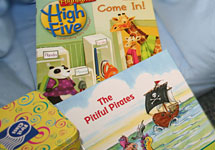Call: 732.530.5566
Request AppointmentPediatric Dentistry
Healthy teeth are important - even baby teeth. Children need healthy teeth to help them chew and to speak clearly. Plus, baby teeth hold space for adult teeth.
You can help your child start on the path to dental health:
- Check your baby's teeth. Healthy teeth should be all one color. If you see spots or stains on the teeth, take your baby to a dentist.
- Clean your baby's teeth ass they come in with a clean, soft cloth or a baby's toothbrush. Clean the teeth at least once a day. It's best to clean them right before bedtime.
- Don't put your baby to bed with a bottle—at night or at nap time. (If you do put your baby to bed with a bottle, fill it only with water.)
- Between feedings, don't give your baby a bottle or sippy cup filled with sweet drinks to carry around. Milk, formula, juice, and other drinks such as soda all have sugar in them. If sugary liquids stay on your baby's teeth too long, it can lead to tooth decay
- If your baby uses a pacifier, don't dip it in anything sweet like sugar or honey.
- Near his/her first birthday, teach your child to drink from an open cup.
- At about age 2 you should start putting fluoride toothpaste on your child's toothbrush.
- Young children cannot get their teeth clean by themselves. Until they are 7 or 8 years old, you will need to help them brush. Try brushing their teeth first and then letting them finish
- Choose foods without a lot of sugar in them and gve your child fruits and vegetables for snacks. Save cookies and other treats for special occasions.
Professional Care
Your child should have a dental visit by his first birthday. At this visit, the dentist will:
- Check your child's teeth.
- Show you the best way to clean your child's teeth.
- Talk to you about other ways to keep your child's mouth healthy.
Fluoride
Fluoride protects teeth from tooth decay. It can even heal early decay.
Fluoride is in the drinking water of many towns and cities. If your water is not fluoridated or if your children's teeth need more fluoride to stay healthy, a dentist can prescribe it in the form of a gel, mouthrinse, or tablet.
Protective Sealants
Fluoride in toothpaste and in drinking water protects the smooth surfaces of teeth but back teeth need extra protection.
Sealants are thin, plastic coatings applied to the chewing surfaces of the back teeth to keep out germs and food. They are painted on as a liquid and quickly harden to form a shield over the tooth. The process is simple and painless.
Children should get sealants on their permanent molars as soon as the teeth come in -- before decay attacks the teeth.

